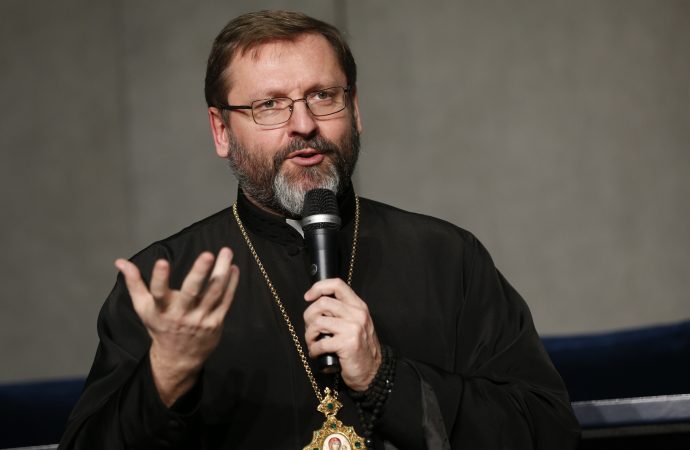Marking the fifth anniversary of Russia’s invasion of eastern Ukraine, the leader of the country’s Greek Catholic Church said Tuesday that while his people are suffering as a result, the world needs to shift from seeing Ukraine as a problem to seeing it as a solution.
“You hear the word ‘Ukraine,’ and you immediately think of problems … humanitarian, socio-political, ecumenical, diplomatic, military, the list goes on,” said Archbishop Sviatoslav Shevchuk, Patriarch of the Greek Catholic Church, the largest of the Eastern churches in communion with Rome.
Yet, he said, “we’re convinced that in our people, our country, things are fermenting that are important for all of you, for the whole world.”
In effect, Shevchuk said, Ukraine is striving to pass from a post-Soviet society marked by endemic corruption and violence to an “authentic, modern democracy” rooted in “European values.”
That promise came with a warning: “The war in Ukraine is not a Ukrainian war,” he said. “It’s a European war, a war in Europe. Sooner or later, it will knock on your doors … it has global repercussions.”
The Greek Catholic leader then challenged what he called two “great lies” and forms of “disinformation” about the conflict, both of which, he implied, are fostered by Russia.
The first is any reference to the violence in Ukraine as a “fratricidal war,” as if one segment of Ukrainian society is fighting another. Shevchuk said if that were true, Russia wouldn’t have more tanks in eastern Ukraine right now than are owned by all EU countries combined.
He insisted that the Greek Catholic Church has parishes in the territory occupied by Russia, and he said the people there “don’t want a war with Ukraine. The feel like prisoners, hostages, of the powerful of this world.”
The second “great lie” Shevchuk strove to debunk is the notion that this is a war between Ukraine and Russia, meaning an ethnic war between two different peoples.
“Most [Ukrainian] soldiers who die every day speak Russian,” he said, and told the story of a Russian-speaking village where residents turned out to resist the arrival of Russian tanks.
“A citizen who has tasted liberty, whether he speaks Russian, or Hungarian, or Polish or Ukrainian,” Shevchuk said, “will defend this liberty.”
Instead, Shevchuk said, this is a war between two different “ways of seeing the future,” between a “return to the Soviet past” and “authentic democracy and resistance to outside despotism.”
Shevchuk was speaking at a Rome event to mark the anniversary of the Russian incursion attended by ambassadors and other representatives of virtually all Western governments, including the United States, in what seemed a show of solidarity for Ukraine in its conflict with Russia.
Russian forces entered eastern Ukraine on Feb. 20, 2014, ostensibly after people in the region known as Crimea voted to join the Russian federation. Since that time, violence among Russian troops, Ukrainian forces, and pro- and anti-Russian paramilitary groups, according to the United Nations, has claimed around 13,000 lives, with more than 3,000 being civilian casualties.
Shevchuk quoted a line from Peter the Great, who described Ukraine as the “bees” of the Russian empire: “They bring honey for our culture, and wax for education and intelligence. When the subject is liberty, however, they bring out their stingers and defend their liberty to the death.”
Recalling that Tuesday would have been the 86th birthday of the late Cardinal Lubomyr Husar, Shevchuk quoted his predecessor to the effect that there is no real political process in Ukraine because “every oligarch has his own party.” The intersection of politics and big money, Shevchuk said, comes at the expense of the common good.
The Greek Catholic leader recalled that this month is also the fifth anniversary of Ukraine’s “Revolution of Dignity,” when he said ordinary citizens “rediscovered their role as protagonists,” which he said now “characterizes the life of Ukrainian society.”
Today, Shevchuk said, one major challenge for civil society is to resist the appeal of “populisms,” which he said offer “quasi-magical solutions to all problems.” Noting that at one point 44 candidates were running for the Ukrainian presidency in national elections this year, he said the Greek Catholic Church is urging citizens to resist anyone posturing as a “political messiah” and justifying the use of violence for political ends.
Shevchuk explained that part of the promise of contemporary Ukraine is to carve out a “third way” between two dominant models of church/state relations.
The first, he said, is the Russian model, in which the state rather than the church is the ultimate guarantor of Christian values, implying a tight union between throne and altar. The second is the “liberal model of secular Europe, where the price of admission to a modern democratic society is abandoning traditional Christian values.”
In Ukraine, he said, there’s a third possibility symbolized by the Cathedral of Santa Sophia in Kiev, which he called an “icon of divine wisdom” which is the “source of human civilization.” Ukraine, he said, is “seeking to rediscover this message,” often drawing on the social doctrine of the Catholic Church.
Shevchuk also addressed the ecumenical situation in his country after the Patriarchate of Constantinople recognized an independent, or “autocephalous,” Orthodox church in Ukraine. He said he didn’t want to enter into the dispute between Constantinople and Moscow that decision created, but he said he could say that the Ukrainian people saw Patriarch Bartholomew’s move as a “pastoral gesture that opened the doors of heaven to those who were consigned to damnation.”
As for the Greek Catholic Church’s relationship with other churches in Ukraine, Shevchuk summarized the situation this way: “We want to be friends with everyone, but not everyone wants to be friends with us.”

